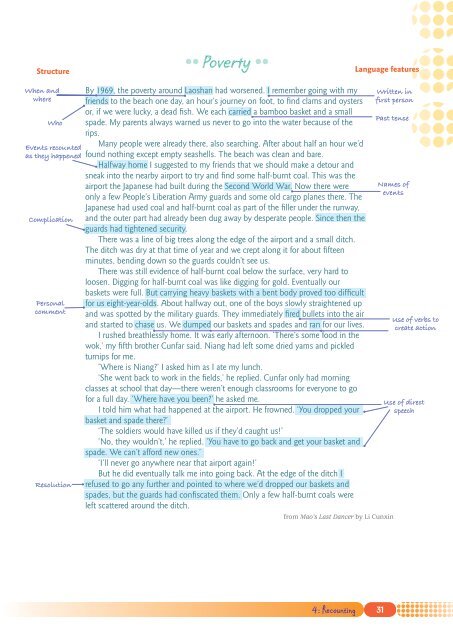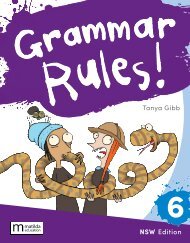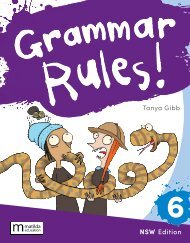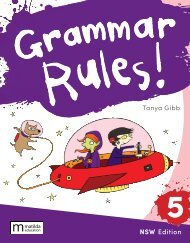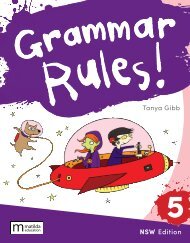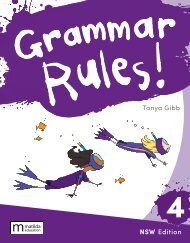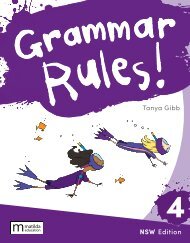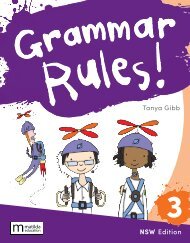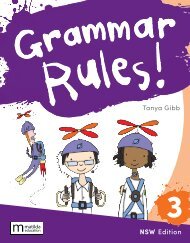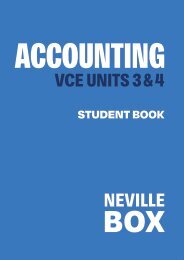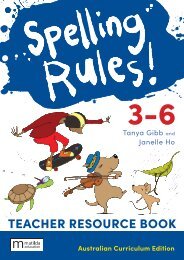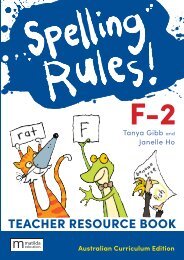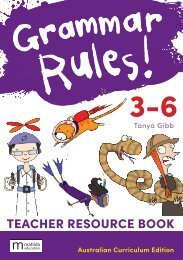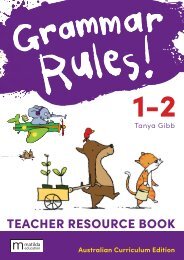National English Skills 7
You also want an ePaper? Increase the reach of your titles
YUMPU automatically turns print PDFs into web optimized ePapers that Google loves.
Structure<br />
•• Poverty ••<br />
Language features<br />
When and<br />
where<br />
Who<br />
Events recounted<br />
as they happened<br />
Complication<br />
Personal<br />
comment<br />
Resolution<br />
By 1969, the poverty around Laoshan had worsened. I remember going with my<br />
friends to the beach one day, an hour’s journey on foot, to find clams and oysters<br />
or, if we were lucky, a dead fish. We each carried a bamboo basket and a small<br />
spade. My parents always warned us never to go into the water because of the<br />
rips.<br />
Many people were already there, also searching. After about half an hour we’d<br />
found nothing except empty seashells. The beach was clean and bare.<br />
Halfway home I suggested to my friends that we should make a detour and<br />
sneak into the nearby airport to try and find some half-burnt coal. This was the<br />
airport the Japanese had built during the Second World War. Now there were<br />
only a few People’s Liberation Army guards and some old cargo planes there. The<br />
Japanese had used coal and half-burnt coal as part of the filler under the runway,<br />
and the outer part had already been dug away by desperate people. Since then the<br />
guards had tightened security.<br />
There was a line of big trees along the edge of the airport and a small ditch.<br />
The ditch was dry at that time of year and we crept along it for about fifteen<br />
minutes, bending down so the guards couldn’t see us.<br />
There was still evidence of half-burnt coal below the surface, very hard to<br />
loosen. Digging for half-burnt coal was like digging for gold. Eventually our<br />
baskets were full. But carrying heavy baskets with a bent body proved too difficult<br />
for us eight-year-olds. About halfway out, one of the boys slowly straightened up<br />
and was spotted by the military guards. They immediately fired bullets into the air<br />
and started to chase us. We dumped our baskets and spades and ran for our lives.<br />
I rushed breathlessly home. It was early afternoon. ‘There’s some food in the<br />
wok,’ my fifth brother Cunfar said. Niang had left some dried yams and pickled<br />
turnips for me.<br />
‘Where is Niang?’ I asked him as I ate my lunch.<br />
‘She went back to work in the fields,’ he replied. Cunfar only had morning<br />
classes at school that day—there weren’t enough classrooms for everyone to go<br />
for a full day. ‘Where have you been?’ he asked me.<br />
I told him what had happened at the airport. He frowned. ‘You dropped your<br />
basket and spade there?’<br />
‘The soldiers would have killed us if they’d caught us!’<br />
‘No, they wouldn’t,’ he replied. ‘You have to go back and get your basket and<br />
spade. We can’t afford new ones.’<br />
‘I’ll never go anywhere near that airport again!’<br />
But he did eventually talk me into going back. At the edge of the ditch I<br />
refused to go any further and pointed to where we’d dropped our baskets and<br />
spades, but the guards had confiscated them. Only a few half-burnt coals were<br />
left scattered around the ditch.<br />
from Mao’s Last Dancer by Li Cunxin<br />
Written in<br />
first person<br />
Past tense<br />
Names of<br />
events<br />
Use of verbs to<br />
create action<br />
Use of direct<br />
speech<br />
4: Recounting<br />
31


